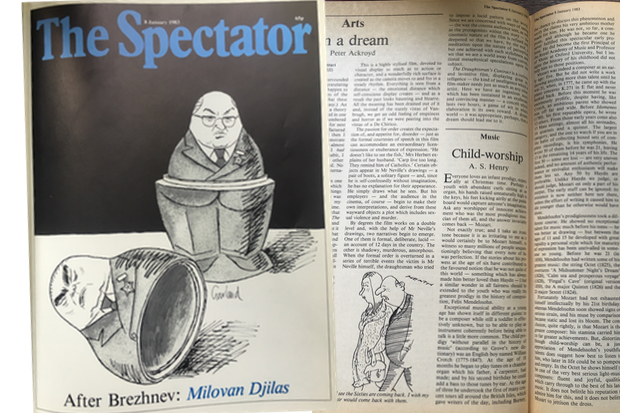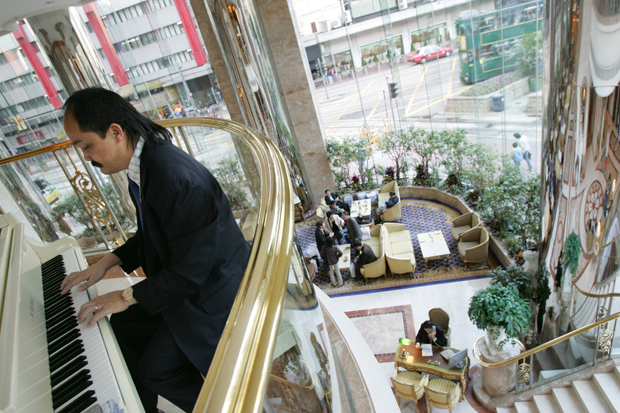Mention of the 70th anniversary of Composer of the Week brings to mind a distinguished list of long-running programmes on Radio 3. They all beg the question of how they have managed to survive so long in an atmosphere of constant doubt about the value of a station that has so few listeners. Time and again it has seemed as though dumbing down would be the fate of all these old shows, if not of Radio 3 itself, and every time a peculiarly British mix of grudging respect for the arts alongside a trenchant nostalgia for familiar things — of the kind that has kept The Archers going since 1951 — has saved them.
Composer of the Week can outrank The Archers, however, having been launched (as This Week’s Composer) in August 1943. It was a classic exemplar of the Reithian intention that broadcasting should ‘inform, educate and entertain’, the last of these coming last. Its early years must have been spent on a general broadcasting channel since the Third Programme didn’t come into existence until 1946, and then only for six hours in the evening between 6 p.m. and midnight. It wasn’t until 1964 that classical music programmes went out during the day, and at that point This Week’s Composer found a regular slot.
Objections to the perceived elitism of the Third Programme could be heard right from the beginning, probably not helped by its founders stating that their aims were to promote ‘something fundamental to our civilisation’ and to contribute to ‘the refinement of society’. Noble motivation never comes over well in the mouths of the privileged, and these people were clearly the recipients of expensive educations. The Third Programme Defence Society, formed when the first round of cuts hit the BBC in 1957, numbered T. S. Eliot, Albert Camus, and Sir Laurence Olivier among its members.
That story of threatened cuts, argument, retrenchment and survival has been a commonplace since then. Further cuts in 1970 created the possibility that the new Radio 3 should share the airwaves of Radios 1 and 2. When the Guardian suggested that Radio 3 should be closed down altogether on the grounds that it had very small listening figures the then Director-General, Charles Curran, said that the numbers of listeners wasn’t important only whether they were ‘worthwhile’.
By such very near-misses with public opinion Radio 3 has stumbled into what it is now. At least it is still there, for which we can thank the stressful balancing act which has obtained so often between the BBC hierarchy and its listeners, the one side idealistic but obliged to be increasingly populist, the other pig stubborn. Take the case of Choral Evensong. This was first broadcast on 7 October 1926 from Westminster Abbey, and is thus the BBC’s longest-running outside broadcast programme — and surely the longest-running in the world. Any attempt to change the formula of this national treasure has resulted in protests so clamorous that the authorities have backed down every time: in 1970 it was moved from Radio 4 to Radio 3 and broadcast monthly. Not long afterwards it returned to its weekly slot on Wednesdays. There it remained until 2007 when an attempt was made to move it to the more obvious Sunday. By September 2008 it was back on Wednesdays, with a recorded repeat on Sundays, though now at 3.30 instead of 4.00 — a break with tradition I still find hard to manage.
It is enormously to the advantage of Choral Evensong, as it is to The Archers, that nothing ever changes in the content of the programme, which in turn seems to represent something eternal about the British people. Mrs Dale’s Diary, for example, lost its constituency when it introduced something almost challenging to its public. The same familiarity of content can be said about CD Review, originally Record Review, which began in 1949; about Jazz Record Requests, which began in 1964; and above all about Test Match Special, which, incredibly, first aired in 1927. The long connection between TMS and Radios 3 and 4 has been one of the more unlikely partnerships in the history of the BBC, but came originally from the mish-mash that was the Third Programme. Many married couples would arrange an armed truce if the husband was allowed to turn on to long wave for the cricket, in return for which the wife would have free access to The Archers.
I long assumed that the Chinese, whose culture is older than ours, would have older libraries, older religious buildings and older cultural artefacts than we do. ‘No,’ a sinologist told me, ‘they’ve destroyed them all.’ We may take preserving our national identity to an eccentric extreme, but in the end the very process is valuable, no matter how nerdy it may sometimes seem.
Got something to add? Join the discussion and comment below.
Get 10 issues for just $10
Subscribe to The Spectator Australia today for the next 10 magazine issues, plus full online access, for just $10.
You might disagree with half of it, but you’ll enjoy reading all of it. Try your first month for free, then just $2 a week for the remainder of your first year.













Comments
Don't miss out
Join the conversation with other Spectator Australia readers. Subscribe to leave a comment.
SUBSCRIBEAlready a subscriber? Log in